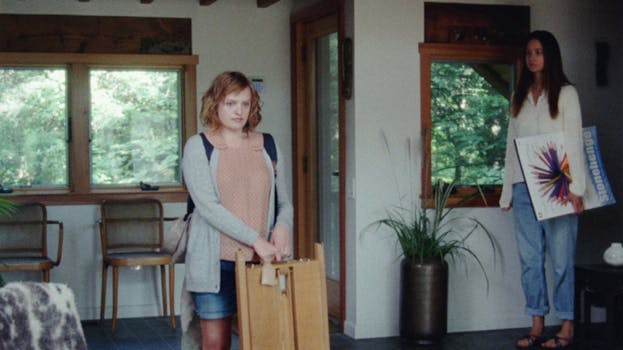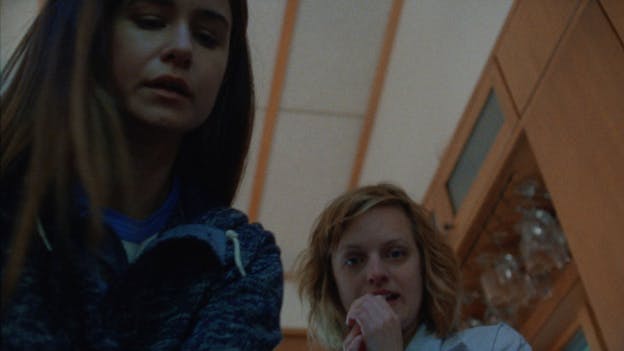There’s a long tradition in cinema of women who keep their friends so close that they begin switch places with one another. Take for instance the 1951 drama All About Eve: the wannabe actress, Eve Harrington (played by Anne Baxter) befriends “superstar” Margo Channing (Bette Davis), only to usurp her by the end of the movie, when Channing is washed up and Eve is the toast of the town. The women’s careers and emotional wellbeing are fused like the two ends of an hourglass. Or take Ingmar Bergman’s Persona, David Lynch’s Mulholland Drive, Lars von Trier’s Melancholia—all psycho-thrillers that revolve around the twinning of female protagonists, who are in some way reflections of one another.
With his fourth feature film, Queen of Earth, director Alex Ross Perry gives us a familiar version of this trope, but polished by some beautiful acting performances. At the start of the movie, Catherine (Elisabeth Moss) is being dumped by her boyfriend James, just months after the suicide of her father, a famous New York City artist, whose business affairs she managed professionally. Fragile and capricious, she goes to stay at her friend Ginny’s parents’ house—a large modern estate full of windows, not far from the city.
Catherine is depicted as a woman on the verge of a breakdown, who throughout the film gets pushed closer and closer to the edge of sanity. While the film never clarifies whether Ginny (Katherine Waterston) and Catherine are clinically depressed (making for a more sophisticated and haunting exploration of emotional authenticity), it seems that both are prone to episodic doldrums and nastiness. Their friendship is stitched together with painfully honest needling. In one scene about halfway through the film, we see Catherine—pale, sweaty, Golem-like—painting Virginia’s portrait. A smug smile flashes across Virginia’s face, betraying the sentiment behind her concerned eyes. “It’s fascinating, I feel like I’m seeing you for the first time,” she says. “I thought you had it all figured out. But you were just surrounding yourself with men.” Catherine fights back tears, her face pulled taut between pain and anger. “I just don’t feel like I exist anymore.”

The movie opens on an emotional upswing for Ginny, a willowy health goth who’s always good for an impromptu salad or a scenic jog, her body encased in raven-black lycra. However, she hasn’t always been the more stable element in the pair. Perry punctuates his film with frequent flashbacks to the previous summer when, though both women still exhibit signs of vicious depression, Ginny is sunk in it, while Catherine is buoyant. During one of their fights, as characteristic of the previous summer as to the current one, Catherine haughtily chastises Ginny for stewing at her parents’ place and never getting a job. “We should trade places,” replies Ginny, “see how we feel then.”
Perry is no stranger to creating characters who supplant, rather than compliment, one another. In his previous feature, Listen Up Philip (2014), a young novelist becomes destructively self-centered following some marginal success. He’s taken in by a much older literary behemoth, reminiscent of Philip Roth, who offers him his country house as a writing retreat. There the two tangle in a cage-match of authorial pretensions until they’ve bloodied just about everyone who’s ever loved them, except one another. “I’m glad he’s replaced himself with a younger surrogate for forlorn moping,” the great American novelist’s twenty-something daughter tells Philip, bitingly.
Whereas in Philip everything was communicated directly through caustic language and skeptical stares, In Queen the story is told with floodlights, mascara-webbed eyes, and empty rooms. In Perry’s multi-storied house of mirroring the women steal long, significant glances form one another. In one scene we see Catherine staring at Ginny’s reflection through a foggy living-room window, before walking back toward her. In another scene, later on, the camera pans out from a shot of Ginny reading on her couch to reveal Catherine surveilling her in secrecy from the porch. The camera often rests on a close-up of one of the women’s faces, so that only the expression on it, and perhaps a bit of dialogue, discloses the subject of her attention. The film gets bogged down in the claustrophobia of cheap signification. The imagery reminds the audience incessantly that in relationships transparency is often a double-edged sword—the more we are seen, the greater the danger that we will be seen how others want to see us.
This may have been exactly the kind of film that Perry set out to make—not a dazzling art-house experience but a highly thematized and tense psychic trip. “This isn’t some sprawling dialogue-driven thing,” Perry told Indiewire at the Berlin International Film Festival, “It does not live in the real world. You don’t know these people. They don’t live next door to you. These people live in the movies.” He cites timeless scary movies like Carnival of Souls and Let’s Scare Jessica To Death as influences. “I don’t have highbrow illusions about what I’m doing,” he said.

If Queen is a wallowing take on a campy horror film, then its men are at once the villains and the unwitting victims you never get attached to, because you know they’ll be the first to die. Catherine and Ginny seem to exist on a different astral plane from the men they’re involved with. These are the men who either abandon them, in the case of Catherine, or force them to wander in an emotional wasteland, as with Ginny. James and Rich (Ginny’s perpetual summer fling) are both late-twenties-to-early-thirties white dudes with relatively fit bodies and pleasing faces. They wear V-necks and eat celery. They are played as archetypes of the insensitive yet inoffensive male monster—their chill demeanor masking a greater need to never be challenged or wrong.
For instance, in one of the strongest scenes in the movie, one of those flashbacks, we see Catherine and Ginny arguing over which of them is the least pathetic. The bemused men watch silently until they eventually recuse themselves from the conversation, muttering dishonestly that they’re “tired.” Later on in the film Rich becomes Catherine’s psychic torturer, taking immense pleasure in poking and prodding her failures. “You’re a real fucking spoiled bitch, you know that? You ain’t shit because of who your father was,” he tells her.
Queen is as much about the bitterness of women as it is about the cruelty of men. These are Elena Ferrante’s women trapped in a Lars von Trier film. In Ferrante’s Days of Abandonment, the narrator, Olga, after being left by her husband for a much younger woman, exclaims that she’s become, “A broken clock that, because its metal heart continued to beat, was now breaking the time of everything else.” It’s a striking line that hits at the nature of Catherine’s own thwarted desires, which increasingly warp time and space about her. As she progresses through the week she seem to cease tallying her days in self-imposed exile, and begin counting down to her extinction.
“You can get out of someone else’s cycle,” Ginny tells Catherine, during a late-night conversation about former lovers, “but you can’t get out of your own.” And it’s true, by force of circumstance Catherine’s been cast out of everyone’s orbit, except Ginny’s. The friends have become like two hands of a watch, synched up to the same cycle, wherein sadness becomes the measure of all things. “It’s always bad,” says Catherine, “just degrees of bad.”
